Polish Music Center Newsletter Vol. 12, no. 12
PMC News
Polish Music Center Appeal
To all of our readers and friends of Polish Music:
The Polish Music Center’s 2005 Fundraising Drive was the first attempt at sharing the goals of our mission with you, the Polish-Americans we strive to serve. Although we were generally satisfied with the results, we would like to make this year’s fundraising much broader and much more successful. We would like to increase the number of responsive participants as well as solicit your opinion on how to present concerts that would attract the widest possible audience.
First of all, we would like to encourage a much greater rate of response from all. Each individual contribution, regardless of amount, matters to us. But, more importantly, greater participation of the Polish-American community is our main goal this time around.
We would also like to ensure that the music programs we offer, on the USC campus and beyond, are actually attended by the greatest possible number of those who receive our mailings and follow our website announcements. As you send your contributions to the Polish Music Center, please also take and moment and indicate to us your preference for the day and the hour when our concerts should take place. Over the past few seasons, Polish music was heard on the following concert series:
- Music at Noon (Wednesdays at USC during the school year)
- 7:30 pm on Thursdays (the USC standard, which we follow for the annual Paderewski Lecture-Recital and other concerts on campus)
- 7 or 8 pm on Fridays or Saturdays (usually outside USC)
- 3 pm on Sundays
Your vote on this will be our guidance for future concert planning.
Finally, we would like to thank all who have contributed in the past. Individual donations are integral to the continuation of our concert programs, publications, library maintenance, and other musical outreach we provide locally, nationally, and internationally. We look forward to your continued support.
To all who plan to help the Polish Music Center this year, we extend our gratitude and an invitation to actively participate in presenting Polish music around the world. Thank you for considering this year’s appeal. We look forward to hearing from you!
Please send your contributions to:
Polish Music Center
USC Thornton School of Music
849 West 34th Street
Los Angeles, CA 90089-0851
Thank you!
Marek Żebrowski, Director & Krysta Close, Manager
Polish Music Center
University of Southern California
News
NOSPR Programming Committee
 Krzysztof Penderecki, Wojciech Kilar and Henry Mikołaj Górecki have become members of a 7 piece programming committee for the Polish Radio National Symphony Orchestra (NOSPR). Creation of the committee comes as a result of change in the orchestra’s affiliation. Previously, the orchestra was solely a part of the Polish Radio organization but now it will be a National cultural institution, co-led by the minister of culture, Polish Radio and the President of Katowice. Krzysztof Penderecki became the chairman of the committee and Wojciech Kilar vice-chair. Other members are: Krystyna Kępska-Michalska, programming director of Polish Radio; Elżbieta Markowska, director of Polish Radio Channel 2; Grzegorz Michalski, vice director of the Fryderyk Chopin Institute; and Grażyna Szołtysik, vice president of Katowice. The committee will be the advisor to the director of the orchestra.
Krzysztof Penderecki, Wojciech Kilar and Henry Mikołaj Górecki have become members of a 7 piece programming committee for the Polish Radio National Symphony Orchestra (NOSPR). Creation of the committee comes as a result of change in the orchestra’s affiliation. Previously, the orchestra was solely a part of the Polish Radio organization but now it will be a National cultural institution, co-led by the minister of culture, Polish Radio and the President of Katowice. Krzysztof Penderecki became the chairman of the committee and Wojciech Kilar vice-chair. Other members are: Krystyna Kępska-Michalska, programming director of Polish Radio; Elżbieta Markowska, director of Polish Radio Channel 2; Grzegorz Michalski, vice director of the Fryderyk Chopin Institute; and Grażyna Szołtysik, vice president of Katowice. The committee will be the advisor to the director of the orchestra.
Herter to Represent Kos. Found.
 Effective November 1 2006, Joseph A. Herter, the 2006 Paderewski Lecturer, will serve as representative of the Kosciuszko Foundation in Warsaw . Born of Polish descent in Detroit, Michigan, Mr. Herter is a graduate of the University of Michigan School of Music and also studied choral conducting at Westminster Choir College with Robert Shaw. He has been a Kosciuszko Foundation grantee, and holds dual Polish and American citizenship.
Effective November 1 2006, Joseph A. Herter, the 2006 Paderewski Lecturer, will serve as representative of the Kosciuszko Foundation in Warsaw . Born of Polish descent in Detroit, Michigan, Mr. Herter is a graduate of the University of Michigan School of Music and also studied choral conducting at Westminster Choir College with Robert Shaw. He has been a Kosciuszko Foundation grantee, and holds dual Polish and American citizenship.
Since 1974, Mr. Herter has been living in Poland . He has been guest conductor at the Polish National Opera, Polish Radio Theater, and at festivals and orchestras throughout Poland. He has established a reputation for introducing major works by Western composers to Polish audiences, including Broadway musicals.
For many years, Mr. Herter directed the Warsaw Schola Cantorum and the St. Anthony Chamber Orchestra, which he founded. He is the founder and director of Cantores Minores, the boys’ choir of the Basilica Cathedral of St. John in Warsaw ‘s Old Town.
Mr. Herter is a musicologist, choral editor and arranger, and has published numerous articles on Polish music and musicians. He has just completed the first major biography of Zygmunt Stojowski, to be published by the Polish Music Center early next year. Mr. Herter has been honored by the Mayor of Warsaw for his services to the city and its citizens.
In announcing Mr. Herter’s appointment, Kosciuszko Foundation President and Executive Director Joseph E. Gore said “Joe Herter has been a friend and associate of the Foundation for many years, and has served us in numerous capacities. I am pleased that he has agreed to serve as the Foundation’s representative in Poland .”
Kaczmarek’s New Project
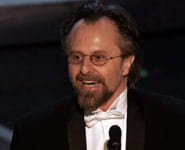 Polish film composer, Jan A.P. Kaczmarek, who has recently won an Academy Award for his score to the movie Finding Neverland, has been hired to compose the soundtrack to European mini series co-production of War and Peace. The series is a cooperation between Italian, German, French, Russian, Spanish, British and Polish broadcasters. The budget of the production is one of the highest in the history of European TV, 26 million Euro. The series should be completed by the fall of 2007, and in Poland it will be shown by the Polsat TV station. Robert Dornhelm is the director of the series and Clemence Poesy, Alexander Beyer and Malcolm McDowell are among the actors.
Polish film composer, Jan A.P. Kaczmarek, who has recently won an Academy Award for his score to the movie Finding Neverland, has been hired to compose the soundtrack to European mini series co-production of War and Peace. The series is a cooperation between Italian, German, French, Russian, Spanish, British and Polish broadcasters. The budget of the production is one of the highest in the history of European TV, 26 million Euro. The series should be completed by the fall of 2007, and in Poland it will be shown by the Polsat TV station. Robert Dornhelm is the director of the series and Clemence Poesy, Alexander Beyer and Malcolm McDowell are among the actors.
XIV Audio Art Fesival
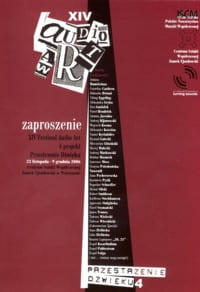 The Audio Art Festival takes place between November 23 and December 9 at the Center for Contemporary Art in Ujazdowski Castle in Warsaw. The festival serves as an alternative to the commercial pop culture as well as the academic avant-garde. The audio-art activities combine characteristics of both fields and add an aspect of new technology, musical play and home created instruments. The Sound Spaces project broadens the scope of festival with concerts and other activities presented in the context of different cultural events. This year’s artists and composers include: Arturas Bumšteinas, Cornelius Cardrew, Dubravko Detoni, Viking Eggeling, Aleksandra Gryka, Ewa Guziołek, Paweł Hendrich, Antanas Jasenka, Andrzej Kijanowski, Wojciech Kosma, Aleksander Kościów, Yannis Kyriakides, Ryszard Latecki, Mieczysław Litwiński, Maciej Małecki, Andrzej Markowski, Bohdan Mazurek, Lawrence Moss, Grażyna Pstrokońska-Nawratil, Anna Pęcherzewska, Kazimierz Pyzik, Bogusław Schaeffer, Michał Silski, Robert Smithson, Karlheinz Stockhausen, Agnieszka Stulgińska, James Tenney, Tadeusz Wielecki, Tadeusz Wierzbicki, Anna Zielińska, Lidia Zielińska, Laptop Quartet “20, 21”, Kwartludium ensemble, Pablostrom ensemble, Volga ensemble and others.
The Audio Art Festival takes place between November 23 and December 9 at the Center for Contemporary Art in Ujazdowski Castle in Warsaw. The festival serves as an alternative to the commercial pop culture as well as the academic avant-garde. The audio-art activities combine characteristics of both fields and add an aspect of new technology, musical play and home created instruments. The Sound Spaces project broadens the scope of festival with concerts and other activities presented in the context of different cultural events. This year’s artists and composers include: Arturas Bumšteinas, Cornelius Cardrew, Dubravko Detoni, Viking Eggeling, Aleksandra Gryka, Ewa Guziołek, Paweł Hendrich, Antanas Jasenka, Andrzej Kijanowski, Wojciech Kosma, Aleksander Kościów, Yannis Kyriakides, Ryszard Latecki, Mieczysław Litwiński, Maciej Małecki, Andrzej Markowski, Bohdan Mazurek, Lawrence Moss, Grażyna Pstrokońska-Nawratil, Anna Pęcherzewska, Kazimierz Pyzik, Bogusław Schaeffer, Michał Silski, Robert Smithson, Karlheinz Stockhausen, Agnieszka Stulgińska, James Tenney, Tadeusz Wielecki, Tadeusz Wierzbicki, Anna Zielińska, Lidia Zielińska, Laptop Quartet “20, 21”, Kwartludium ensemble, Pablostrom ensemble, Volga ensemble and others.
For more information in Polish about the festival please visit www.glissando.pl.
Activities Of The Fryderyk Chopin Institute
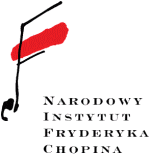 Polish National Chopin Piano Competition
Polish National Chopin Piano Competition
One of the most significant musical competitions in Poland, the National F. Chopin Piano Competition will take place from November 28 until December 3 at the Ostrogski Castle and F. Chopin Academy of Music in Warsaw. Young talented pianists will be judged by distinguished pianists and pedagogues from Polish Academies of Music. This year’s jury will include: Waldemar Andrzejewski, Kazimierz Gierżod, Krzysztof Jabloński, Bronislawa Kawalla, Grzegorz Kurzynski, Zbigniew Lasocki and Wojciech Switala. For the first time in the nearly 40-year history of the competition, the 1st prize winner will give two recitals in Miami, Fl, and the 2nd prize winner will perform in Geneva. Auditions will be open to the public.
“Chopin in Paris : The 1830s” – VI International Conference
The Fryderyk Chopin Institute in Warsaw announces an international conference entitled Chopin in Paris: The 1830s. The conference will take place in Warsaw, 30 November – 2 December 2006.
The main focus of the conference will be on Chopin’s first decade in Paris, and papers may engage with this theme from a variety of perspectives: the cultural context, including concert life and opera; the climate of ideas, as registered through journals and other literature; the context of virtuoso pianism; and the styles and structures of Chopin’s compositions.
The scholarly committee of the conference is Profs. Jim Samson and Zofia Chylińska, the Deputy Director is Grzegorz Michalski, and the organizing committee consists of Artur Szklener, Anna Iwanicka-Nijakowska, and Marita Albán Juárez.
For the circulated papers of the conference and full schedule of events and speakers, see www.nifc.pl/chopin/events/news/id/269.
Lechoń & Szymanowski

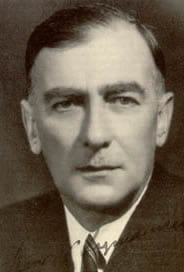 The Kosciuszko Foundation presented An Evening of Poetry and Music on Thursday, November 30 at 7:00 p.m., honoring Jan Lechoń, poet, and Karol Szymanowski, composer, at the Foundation House. The event commemorated the 50th Anniversary of the great poet’s death. This “salon” featured readings of Lechoń’s poetry in Polish and English, and performances of music by Szymanowski, Lechoń’s friend. Beata Dorosz of the Institute of Literary Research , Polish Academy of Sciences gave an introduction to the evening.
The Kosciuszko Foundation presented An Evening of Poetry and Music on Thursday, November 30 at 7:00 p.m., honoring Jan Lechoń, poet, and Karol Szymanowski, composer, at the Foundation House. The event commemorated the 50th Anniversary of the great poet’s death. This “salon” featured readings of Lechoń’s poetry in Polish and English, and performances of music by Szymanowski, Lechoń’s friend. Beata Dorosz of the Institute of Literary Research , Polish Academy of Sciences gave an introduction to the evening.
Jan Lechoń (1899-1956) was one of Poland’s most interesting and gifted poets of the twentieth century; some experts even claim that he would have become a third Nobel laureate, ranking with Czesław Miłosz and Wisława Szymborska.
Already publishing poetry at the age of 13, Lechoń (whose real name was Leszek Józef Serafimowicz) entered the University of Warsaw at 16 to study philology, and during his student days completed two collections of poetry and a one-act play that was performed by some of Warsaw’s leading actors. As a result, he was invited into Warsaw’s cultural aristocracy. But he was emotionally unstable, and a nervous breakdown and attempted suicide clouded his youth. In 1930, he left Warsaw and attached himself to the Polish Embassy in Paris, where he served as an unofficial cultural attaché. In 1939, with the outbreak of war, he fled Paris, moving through Portugal and South America. He finally settled in New York in 1941, and remained here the rest of his life. During World War II, he contributed to the propaganda efforts of the Polish Government-in-Exile.
At the suggestion of a psychiatrist, Lechon began keeping a diary (Dziennik, 1949-56), containing some of his most fascinating writing. He documented his own inner life, but also included perceptive observations on world events, Polonia in the United States, and life in New York City. He was, however, obsessed by feelings of futility as an émigré here, and was unable to write poetry. Finally, he jumped to his death on June 8, 1956 from a Manhattan hotel window.
The Unfashionable Poet
They say: ”Nothing can bring back the time that has gone,
Soon even its memory in young minds fades with age,
Take away those old tricks you have used and have done –
By and by there will be a new play on the stage.
What can I do? Get drunk with the ambrosia flask,
Left over from the roaring banquets of my youth.
Exit: with rose in hand and the moon in my cask –
The rest I leave to young poets; let them do it.
– Jan Lechoń, (translated by Agnieszka Maria Gernand )
Kosciuszko Foundation programs are supported by the The Anne Felicya Cierpik Fund, the Mary Koons Charitable Trust, and the Kosciuszko Foundation Cultural Fund.
Awards
Tansman Competition Results
 The 6th edition of the International Tansman Festival and Competition of Musical Personalities took place in Łódź between November 14 and 18. This year’s focus was the composer’s competition. The Festival featured an international jury consisting of widely known musical personalities: Zygmunt Krauze – chairman (Poland), Krzysztof Penderecki (Poland), Heinz Holliger (Switzerland), Michael Nyman (Great Britain), Wing Wah Chan (Hong Kong), Joel Hoffman (USA), Menachem Zur (Israel). The Grand Prix of the competition went to Krystof Maratka (Czech Republic) for Luminarium – Concerto pour clarinette et orchestre, the 2nd prize was not awarded, and the 3rd prize was shared ex- aequo by John Marlow Rhys (Great Britain) for Primavera and La Luna Piena – Song cycle for high soprano and orchestra and Satoshi Ohmae (Japan) for Spazio Variato per orchestra. 4th prize was given to Geoffrey Álvarez (Great Britain) for Concertino for chamber orchestra, and the Audience Award went to Krystof Maratka (Czech Republic) Luminarium – Concerto pour clarinette et orchestre. For more information about the festival and competition please visit www.tansman.lodz.pl .
The 6th edition of the International Tansman Festival and Competition of Musical Personalities took place in Łódź between November 14 and 18. This year’s focus was the composer’s competition. The Festival featured an international jury consisting of widely known musical personalities: Zygmunt Krauze – chairman (Poland), Krzysztof Penderecki (Poland), Heinz Holliger (Switzerland), Michael Nyman (Great Britain), Wing Wah Chan (Hong Kong), Joel Hoffman (USA), Menachem Zur (Israel). The Grand Prix of the competition went to Krystof Maratka (Czech Republic) for Luminarium – Concerto pour clarinette et orchestre, the 2nd prize was not awarded, and the 3rd prize was shared ex- aequo by John Marlow Rhys (Great Britain) for Primavera and La Luna Piena – Song cycle for high soprano and orchestra and Satoshi Ohmae (Japan) for Spazio Variato per orchestra. 4th prize was given to Geoffrey Álvarez (Great Britain) for Concertino for chamber orchestra, and the Audience Award went to Krystof Maratka (Czech Republic) Luminarium – Concerto pour clarinette et orchestre. For more information about the festival and competition please visit www.tansman.lodz.pl .
Romuald Twardowski Awarded
 Polish composer, Romuald Twardowski , has received the I. J. Paderewski Award from the International Friends of Music Association – Committee of the I. J. Paderewski Award in Baltimore. The Paderewski award is given bi-annually by the Committee. Twardowski has received the award for his outstanding achievements in music composition and social-cultural activities.
Polish composer, Romuald Twardowski , has received the I. J. Paderewski Award from the International Friends of Music Association – Committee of the I. J. Paderewski Award in Baltimore. The Paderewski award is given bi-annually by the Committee. Twardowski has received the award for his outstanding achievements in music composition and social-cultural activities.
Discography
New from DUX
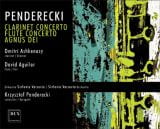 Penderecki – Clarinet Concerto, Flute Concerto, Agnus Dei
Penderecki – Clarinet Concerto, Flute Concerto, Agnus Dei
Krzysztof Penderecki: Concerto for Clarinet and Orchestra, Concerto for Flute and Orchestra, Agnus Dei
Dmitri Ashkenazy, clarinet; David Aquilar, flute; Sinfonia Varsovia; Krzysztof Penderecki, conductor
DUX 0559
 Polish pianists at the XV International Chopin Piano Competition
Polish pianists at the XV International Chopin Piano Competition
Frederic Chopin: Mazurkas, Polonaise, Bolero, Scherzo, Rondo, Ballade
Rafał Blechacz, Piotr Banasik, Krzyszof Trzaskowski, Jacek Kortus, Gracjan Szymczak – piano
DUX 0069
 Stabat Mater, Arias – Bononcini
Stabat Mater, Arias – Bononcini
Antonio Maria Bononcini (1677-1726): Stabat Mater a quattro con violini, La decollazione di San Giovanni Battista, La Maddalena a piedi di Cristo
Johann Joseph Fux (1660-1741): Aria di Misericordia
Collegio di Musica Sacra (Wrocław), Andrzej Kosendiak – cond.
DUX 0492
Julian Fontana Project
A new World Premiere recording project is in the works for Hubert Rutkowski, pianist and Acte Préalable Recording Project Competition 3rd prize winner. Read about the project on www.hubertrutkowski.ovp.pl, which includes biographical information about the subject, Julian Ignace Fontana, known best for close relationship with Frederic Chopin. More information is also available on www.julianfontana.com.
New Skowronski Release
 SKOWRONSKI PLAYS! ~AVEC ET SANS~ Volume II – Live in Concert
SKOWRONSKI PLAYS! ~AVEC ET SANS~ Volume II – Live in Concert
Works for Violin and Piano: Nigun, Ernest Bloch; Sea Shell, Carl Engel; Dance of the Harnaise & Sonata in D Minor, Karol Szymanowski
Vincent P. Skowronski , violin & Saori Chiba, piano
Works for two solo violins: Sonatine , Arthur Honegger ; Duo, Darius Milhaud
Vincent P. Skowronski & Katherine Hughes, violins
( S :CR -08 )
The excerpts below are from WQXR-FM’s highly prestigious radio review program, “ First Hearing.” The critics commenting on the Szymanowski Sonata in D Minor are Martin Bookspan and Speight Jennings:
“Vincent P. Skowronski provides us with a performance of the Szymanowski Sonata that is wonderfully played. I love his self-indulgence, the portamentos, the tremendous panache…the way this kind of music should be played.” —Martin Bookspan —
“I agree with you, Martin…this is a wonderful performance of the sonata by Mr. Skowronski… and beautifully recorded.” —Speight Jenkins—
Pianists – Defining Chopin
Pianists – Defining Chopin is a story of four American pianists, the top winners of the US National Chopin Competition, as they represent the country at the 2005 International Chopin Piano Competition in Warsaw, Poland. The Chopin Piano contest in Poland is the oldest and the most prestigious piano contest in the world. This film unfolds in cinema verite style, as we follow the contestants through each stage of the grueling 30 days long competition. We experience the individual highs and lows through the enormous psychological and physical toll they are required to endure and we learn what it really means to be a pianist: the price they pay. It is a tale of victory and defeat, of joy and disappointment, of great life experiences and adventure, always with Chopin’s magnificent music at its center.
Pianists – Defining Chopin is also a profoundly educational film as it is highlighted throughout by teachers and students discussing the secrets of and approaches to Chopin’s music, analyzing the Polish nature of Mazurkas and Polonaises, trying to pin down whether there is an “ideal” interpretation of Chopin.
This film was made possible by the participation of: Veda Kaplinsky of the Juilliard School of Music in New York; Susan Starr of the Curtis Institute of Music in Philadelphia; Emilio Del Rosario of the Music Institute of Chicago; Enrique Graf of the College of Charleston, SC; Ruth Slenczynska; Agustin Anievas; Edward Aldwell and; Seymour Bernstein.
To learn more about the film and to purchase, please visit www.tomaszmagierski.com.
Poland Abroad – Vol. I
By Gary Fitelberg
 Poland Abroad: Music for String Orchestra features four Polish composers and their works. These include Alexandre Tansmann (1897-1986) and Triptyque (1930); Szymon Laks (1901-1983) and Sinfonettia (1936); Jerzy Fitelberg (1901-1951) and Concerto (1928); as well as Mieczsław Karłowicz (1876-1909) and Serenade, Op.2 (1897). This compendium of composers and compositions for strings has been preserved for posterity archivally in music for string orchestra by conductor Jurgen Bruns and the Kammersymphonie Berlin.
Poland Abroad: Music for String Orchestra features four Polish composers and their works. These include Alexandre Tansmann (1897-1986) and Triptyque (1930); Szymon Laks (1901-1983) and Sinfonettia (1936); Jerzy Fitelberg (1901-1951) and Concerto (1928); as well as Mieczsław Karłowicz (1876-1909) and Serenade, Op.2 (1897). This compendium of composers and compositions for strings has been preserved for posterity archivally in music for string orchestra by conductor Jurgen Bruns and the Kammersymphonie Berlin.
“Poland Abroad” was the working title of a festival that ultimately took place in Berlin ‘s Konzerthaus during October 22 through 30, 2004 under the motto“ Poland in the heart – Composing abroad: Polish composers in Europe 1850-1950.” This concert series, organized at the author’s suggestion by Berlin ‘s Konzerthaus, Deutschland Radio, and the Rundfunk Orchestra, and accompanied by an international musicological symposium at Berlin ‘s University of the Arts, was held around the time of Poland ‘s entry to the European Union. It represents the first major presentation devoted exclusively to Polish music of the Romantic to the Classical Modern era. The concerts were broadcast throughout Germany by Deutschland radio, and also in Poland, France, and other European countries as a result of international composition between broadcasting syndicates.
In addition to two orchestra concerts, given by Radio Symphony Orchestra Berlin and the Berlin Symphony Orchestra, chamber concerts given by the Kammersymphonie Berlin, the European Fine Arts Trio, and the Szymanowski Quartet were also heard. A total of twenty-eight works by fifteen composers were performed in six different programs, including a piano-voice recital, which opened the symposium at the University of Arts. Many of these were German or at least Berlin first performances. In the case of Alexandre Tansmann’s Fourth Symphony, it was the world premiere concert performance.
With “Poland Abroad” (EDA-36), the Editions Abseit label begins a new series that is intended to be a continuation of the festival in Berlin, and in a sense of sustainability, offers both a part of the repertoire performed there as well as works of Polish composers not represented there. Polish composers and exiles of the late nineteenth and early twentieth centuries, victims of economic and political persecution, received their artistic imprint abroad. First in the cultural centers of Germany and France – Berlin and Paris – and also later in America. With the “Poland Abroad” series, which will be issued at irregular intervals, EDA intends to feature this aspect of Polish music history, its composers and their compositions as well as the consequences of the Shoah on Polish music life. Until lately, this topic has not been thoroughly explored.
This archival CD sound recording is the result and subject of the program performed by the Kammersymphonie Berlin at the aforementioned festival at the Berlin Konzerthaus on October 26, 2004 and later recorded at the Deutschland Radio in Studio 10.
These four forgotten composers and compositions can finally be forgiven for being in exile, on the basis of nationality and/or religion, and the victims of dark economic and political persecution and upheaval. This CD shed some light on their superb talent of these men of music.
For further information on ordering the CD, check out www.klassikcenter-kassel.de/eda.htm or for the orchestra, artistic director, projects and repertoire, visit www.kammersymphonie-berlin.de .
Knittel – Music Of Our Times
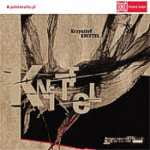 Krzysztof Knittel – Music of Our Times
Krzysztof Knittel – Music of Our Times
Krzysztof Knittel: Concerto for Harpsichord and Orchestra, Memoirs from the Warsaw Uprising, El maale rahamim, Lipps for Jazz Trio and Orchestra
Elżbieta Chojnacka – harpsichord; National Philharmonic Symphony Orchestra; Antoni Wit, conductor; Piotr Adamczyk, Stanisława Celińska, Mateusz Damięcki, Agnieszka Grochowska, Władysław Kowalski – actors; Karolina Jaroszewska – cello; Aleksandra Krzanowska – piano; National Philharmonic Choir; Sinfonia Varsovia; Wojciech Michniewski – conductor; Jacek Partyka – electronic instruments; National Polish Radio Symphonic Orchestra in Katowice; Camerata Silesia Choir; Krzysztof Knittel – electronic instruments; Tomasz Szukalski – tenor saxophone; Wojciech Czajkowski – acoustic bass; Janusz Stefański – drums; Jacek Kaspszyk – conductor
PRCD 079
Royal String Quartet on BeArTon
Royal String Quartet is arguably one of the best and most successful Polish string quartets. These young musicians have already won numerous awards, recorded 4 CDs and are a part of BBC’s New Generation Artists program. They have performed all around the world and studied with world renowned artists. Below are two of their latest CDs released on Polish BeArTon label.
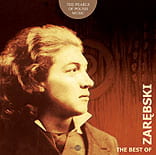 Royal String Quartet – The Best of Zarębski
Royal String Quartet – The Best of Zarębski
Juliusz Zarębski: Piano Quintet Op.34, Roses and Thorns Op.13
Royal String Quartet: Izabella Szałaj-Zimak – violin, Elwira Przybyłowska – violin, Marek Czech – alto, Michał Pepol – cello; Wojchech Świtała – piano
CDB036
From BeArTon’s website: “In any talk about 19th-century Polish music two names inevitably crop up: Fryderyk Chopin and Stanisław Moniuszko. Adding a third name into the picture, that of Juliusz Zarębski, all too often provokes astonishment and sometimes even consternation. The fact that Poland boasted such an outstanding composer and pianist, a cosmopolitan artist who studied with Liszt and a citizen of Europe, who followed, in a certain sense, the path of Chopin is not present in the public consciousness. This despite the fact that the high artistic merit of his musical output earned him the top place among Polish composers of the post-Chopin period. Zarębski indeed represented innovative concepts of European calibre which appeared in Polish music in the second half of the 19th century.” [ Marek Wieroński ]
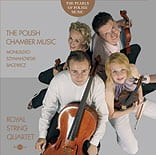 Royal String Quartet – Quartets of Moniuszko, Szymanowski, Bacewicz
Royal String Quartet – Quartets of Moniuszko, Szymanowski, Bacewicz
Stanisław Moniuszko: String Quartet No. 1 in D Minor; Karol Szymanowski: String Quartet No. 2 Op. 56; Grażyna Bacewicz: String Quartet No. 4
Royal String Quartet: Izabella Szałaj-Zimak – violin, Elwira Przybyłowska – violin, Marek Czech – alto, Michał Pepol – cello
CDB035
From BeArTon’s website: “Without belittling the contribution of 19th-century composers to the development of chamber music, there is no doubt that it was members of the Young Poland group in the early 20th century, notably Karol Szymanowski, who imbued string quartet writing with a stamp of freshness and originality, giving it a new and important role. From that time onwards, the string quartet has never ceased to be an area of exploring innovative and experimental ideas by all prominent Polish composers.
The string quartets by Stanisław Moniuszko, Karol Szymanowski and Grażyna Bacewicz featured on this CD are very representative for the periods in which they were composed. They are examples of various kinds of musical expression and form of the string quartet in its specifically Polish shape.” [ Marek Wieroński ]
Performances
A Festive Evening At Loyola Marymount
The Consulate-General of the Republic of Poland in Los Angeles sponsored an evening commemorating Polish Independence Day and the 25th anniversary of the imposition of Martial Law in Poland. A full house at Murphy Hall at Loyola Marymount University in Los Angeles welcomed the Honorable Krystyna Tokarska-Biernacik, who delivered the opening remarks. The Consul-General’s historical introduction about the two anniversaries was followed by an awards presentation to three outstanding members of Polish community in Southern California. Mr. Zdzisław Zakrzewski was decorated with the Commander’s Cross of the Polonia Restituta Star, Mr. Andrzej Dąbrowa was decorated with the Chevalier’s Cross of Merit, and Ms. Anna Zdrowak received a Medal of the Commission of National Education. The Honorable Paulina Kapuścińska, Consul for Culture & Media, joined Madame Tokarska-Biernacik in the presentation of the awards.
Following the official introduction, pianist Wojciech Kocyan—the First Prize Winner of the Paderewski Piano Competition in Bydgoszcz —presented a recital of works by Chopin. His strong opening with the Ballade in G minor, Op. 20 was followed by a virtuoso presentation of three Etudes from Opus 10 and 25. The two Nocturnes (Op. 55 and 27) and the fiery Scherzo in B-flat minor, Op. 31 suitably framed Mr. Kocyan’s musical offering. The appreciative audience gave the artist a standing ovation, eliciting a generous encore from Mr. Kocyan—the famed A-flat Polonaise, Op. 53, which provided a grand and fitting conclusion to this festive evening.
[MZ]
Ptaszyńska’s Elegia Rises Above
 An impressive performance of Polish composer Marta Ptaszyńska’s composition for solo viola, Elegia in memoriam John Paul II , was presented by Composers Concordance on May 25, 2006 at the New York University Frederick Loewe Theatre. The American premiere of this piece took place at USC in Los Angeles during the annual Paderewski Lecture-Recital in October 2005 which featured Marta Ptaszyńska. According to the program notes written by the composer for the Paderewski Lecture-Recital: “Elegia in Memoriam Pope John Paul II for viola solo is dedicated to the memory of the late Pope and based on an old Icelandic prayer folk song, dating from the ninth century:
An impressive performance of Polish composer Marta Ptaszyńska’s composition for solo viola, Elegia in memoriam John Paul II , was presented by Composers Concordance on May 25, 2006 at the New York University Frederick Loewe Theatre. The American premiere of this piece took place at USC in Los Angeles during the annual Paderewski Lecture-Recital in October 2005 which featured Marta Ptaszyńska. According to the program notes written by the composer for the Paderewski Lecture-Recital: “Elegia in Memoriam Pope John Paul II for viola solo is dedicated to the memory of the late Pope and based on an old Icelandic prayer folk song, dating from the ninth century:
O great God of the earth,
Hear now my prayer rising upward,
Waken my soul to Thy good!
O great maker of life,
Give now my spirit Thy beauty,
Fill all my days with Thy work!
The intensity of mood and expression is preserved throughout the entire piece. Despite the mournful character of the music, the texture is vibrant and full of contrasting colors.”
Composers Concordance (“Compcord”) is a presenting organization for contemporary music founded in 1983 by Patrick Hardish and Joseph Pehrson. It offers a yearly concert series in chamber settings, working closely with composers and performing works that the composers feel are the most valuable to their careers.
The Compcord concert featuring Ptaszyńska’s composition was reviewed in the most recent issue of the New Music Connoisseur (Summer/Fall 2006, pp. 20-21) by Anne O’Neill. The Connoisseur is a newsletter focusing on the work of the composers of our time, with additional coverage of rare and neglected classical music from all national and ethnic sources. According to O’Neill, Ptaszyńska’s Elegia was a “simple and yet affecting tribute,” whose “sheer musical rapture” set it apart from the rest of the selections on this daring concert program. The viola soloist, Michael Hall, captivated his audience with his “utterly masterful [performance]… sheer involvement and a gorgeous tone.” One can only hope that such a review will help to secure Elegia in Memoriam Pope John Paul II (2005) a place in the standard concert hall repertoire.
“Impression of Łódź”
 The musical improvisations of renowned film director David Lynch, and pianist, composer and PMC director Marek Żebrowski traveled from New York (see November Newsletter ) to Poland on Saturday, November 25, as a featured event of the opening of the Camerimage Festival in Łódź. With Lynch on keyboards and Żebrowski on a Steinway concert grand, the two again spun keyboard improvisations based on various vignettes from the city of Łódź. This event preceded the Polish premiere of the new David Lynch film, Inland Empire, on which Żebrowski and Lynch collaborated. Inland Empir was filmed partly in Łódź, the center of filmmaking in Poland. For more details on the festival, visit the official website: www.camerimage.pl .
The musical improvisations of renowned film director David Lynch, and pianist, composer and PMC director Marek Żebrowski traveled from New York (see November Newsletter ) to Poland on Saturday, November 25, as a featured event of the opening of the Camerimage Festival in Łódź. With Lynch on keyboards and Żebrowski on a Steinway concert grand, the two again spun keyboard improvisations based on various vignettes from the city of Łódź. This event preceded the Polish premiere of the new David Lynch film, Inland Empire, on which Żebrowski and Lynch collaborated. Inland Empir was filmed partly in Łódź, the center of filmmaking in Poland. For more details on the festival, visit the official website: www.camerimage.pl .
An Afternoon With Ptaszyńska
On Saturday October 14th, the New York Public Library for the Performing Arts hosted an afternoon with Polish composer Marta Ptaszyńska featuring her Holocaust Memorial Cantata in the Bruno Walter Auditorium, as a part of their “Treasures of the Music Division” series. The Holocaust Memorial Cantata was written for solo voices, mixed choir and orchestra (percussion, harp, strings) to a poem by Leslie Woolf Hedley entitled Chant for All the People on Earth, written in English, Hebrew, Yiddish and Polish. A Professor of Composition at the University of Chicago, Ms. Ptaszyńska donated her manuscript for the piece to the Library’s Music Division several years ago. During this program, Ms. Ptaszyńska discussed the work and a film of the Cantata in concert under the baton of Lord Yehudi Menuhin and performed by Sinfonia Varsovia and the Warsaw Chamber Choir with soloists Zofia Kilanowicz, Roman Gierlach and Ryszard Minkiewicz was screened.
Stojowski Collection Update
In 2005, the Polish Music Center at USC received a generous donation of manuscripts, sketches, correspondence, and published scores of music by Zygmunt (Sigismond) Stojowski (1870-1946) from the composer’s family. Now known as the Zygmunt & Luisa Stojowski Collection, this new addition to the PM archive consists of 32 boxes of varying sizes. During the summer of 2005, the Stojowski Collection was appraised by a specially hired expert. Although study copies will remain in the Polish Music Center, the originals will reside permanently in Special Collections at the Doheny Library on the USC campus. In the coming months, as the Collection’s detailed inventory is being made, we will continue publishing the contents in our Newsletter, informing our public of this important legacy left by a fascinating and undeservedly forgotten composer. All inquiries regarding the Stojowski Collection should be directed to the Polish Music Center at USC via e-mail to: polmusic@thornton.usc.edu . The following is our report on the contents of Box V of the Stojowski Collection.
[MZ]
BOX VI
Case XXXI: Luisa Stojowska: Financial Records
- Folder no. 1:Contains correspondence regarding the Stojowski apartment at 16 East 96th Street
2. Folder no. 2:Contains numerous bills and medical records, including a copy of Luisa Stojowska’s autopsy
3. Folder no. 3: Contains Russian Imperial Bonds in denomination and an envelope addressed to Luisa Stojowski from the Foreign Claims Settlement Commission in Washington, DC
4. Folder no. 4: “Fire Loss List” – a detailed listing of items lost in the July 1967 fire in the Stojowski residence and letter from LS to the insurance company
5. Folder no. 5: Contains numerous cancelled checks, bankbooks, check registers, and other records of financial transactions
6. Manila envelope “A” – contains telephone records of Luisa Stojowska
Case XXXII: Luisa Stojowska: Musical Records
- Three notebooksof Luisa Morales-Macedo (1914-15; 1915-1916; undated), containing exercises in music theory and harmony
2. A register, with initials L.M.S. on front cover, containing records of students’ attendance, repertoire, class recitals, etc. Begins with “Season 1931-1932;” ends on an entry dated 7 May 1942
3. Copiesof the article from the National Guild of Piano Teachers: “Mme. Stojowski Tells secret of Practicing” [some contain additional text, typed on the top of the page]
4. A small pennant from the “II Concorso Internacional de Piano do Rio de Janeiro ”
Case XXXIII: Luisa Stojowska: Correspondence
- Folder no. 1: Correspondence in English. Contains postcards, Christmas & Easter cards and some letters from family, friends and acquaintances
2. Folder no. 2: Correspondence in French. </stron